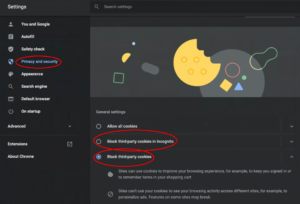A new feature in the Chrome browser has already started to disable third-party cookies. It is now initially available to 1% of global users, or about 30 million people. Google described the changes as a test, with plans for a full rollout to eliminate cookies later this year. However, some advertisers feel that their business would suffer as a result.

Gatekeeping for Users’ Privacy
The world’s most popular internet browser, Google’s Chrome, reigns with 3.2 billion internet users worldwide (as of the December 2023 report).
For privacy advocates, cookies are the ‘original sin’ of the Internet. Throughout most of the web’s history, cookies were one of the primary ways technology companies tracked your behavior online For targeted advertising and many other types of tracking, websites rely on cookies created by other companies (such as Google). Now, these are known as “third-party cookies” and are built into the Internet’s infrastructure They are everywhere.

Google said that it’s working to make the internet more private. randomly-chosen users will be asked if they want to “browse with more privacy”.
Anthony Chavez, Google vice president, said in a blog post, “We’re taking a responsible approach to phasing out third-party cookies in Chrome.
“If a site doesn’t work without third-party cookies and Chrome notices you’re having issues… we’ll prompt you with an option to temporarily re-enable third-party cookies for that website.”
Which cookies are being deleted by Google Chrome?
A cookie is a text file with numbers that are supposed to be unique to you, or at least to your recent browsing sessions. Websites store these cookies in your browser, and when you visit a site, they check to see if they recognize your cookies. That’s used to check databases for information about you.
First-party cookies” are cookies that are operated by the website you’re looking at. These can be harmless and even useful.
Third-party cookies help online advertising companies keep track of every website you visit and the things you do when you’re there. These are the ones that Googlehas started to disable it.
How to access if Google turned off your cookies
The first thing you’ll see is a popup in Chrome, describing Google’s new “tracking protection,” as the company calls its plan to kill cookies.
There are other signs you can look for that you’re not getting a bunch of cookies thrown at you. When tracking protection is turned on, you’ll see a little eyeball logo in the URL bar.

You can also check your browser’s preferences. When you open Chrome’s settings, you’ll find a bunch of nice toggles and controls about cookies under the “Privacy and Security” section. If they’re all on and you don’t remember changing them, you are one of the 30 million in Google’s early testing phase.
Google is still tracking users in a more personal way to keep the ad business running
Cookies are an important part of the ad sales they rely on. For some, that ad may seem intrusive. Critics argue that Google’s move does not provide true privacy, turning the browser from a user agent to an advertising agent.
Google responded that protecting consumer privacy online does not mean making it harder for publishers to generate revenue.
Of course, Google isn’t going to destroy its own business. It doesn’t want to hurt every company that makes money through advertising, as Google is fighting numerous lawsuits from regulators accusing the company of running a giant monopoly on the Internet.

So, Google is replacing cookies with a new way to track users that collects your data in a way that, according to Google, is much better for your privacy. Google calls this project the “Privacy Sandbox.”
It involves some incredibly complex tools and technologies. In general, the Chrome browser itself will track what you do online, but it stores that data on your device instead of sending it to Google or anyone else.
Google’s senior director of product management for the privacy sandbox, Victor Wang, said in an April 2023 interview that Google has a team called the Privacy Sandbox.

It aims to support the larger company’s mission to ensure accessible and useful information, keeping people’s activities private across the free and open Internet.
The Privacy Sandbox project has introduced new tracking methods for storing user data on devices and categorizing users into groups based on their online activity.
Websites and advertising agencies can ask Chrome what groups users belong to (such as those who like high-performance auto parts or hair removal products).
However, there is no way for the company to learn about your personal browsing behavior without breaking Google’s rules.










